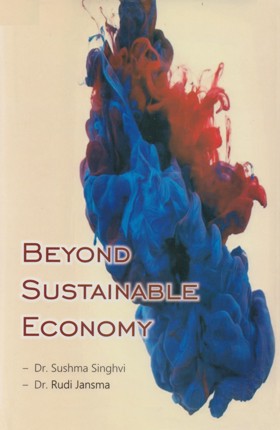Introduction
For building a better world, the transformation should begin at the individual level
- Acharya Mahapragya
The world economic order is changing rapidly due to the advancement of science and technology. The world has been transformed into a global village. Due to the process of globalization and the technological explosion the business world in India and abroad are facing global challenges, i.e. challenges of survival, challenges of change, challenges of competition and customer satisfaction.
Present Scenario:
At present we are living in an age of corruption, greed, conflict, violence and terrorism, which in Hinduism is known as Kali Yuga, i.e. the age of darkness and impurities, which is an extremely explosive troubled time where the context of human life is changing every moment.
Need of aparigraha - non-possession for social change
Social change is a universal phenomenon and it occurs in every society. Change is inevitable and it takes place in all fields. The term 'social change' is often used to describe variations in, or, modifications of any respect of social process, social patterns, social interaction or social organization. Great thinkers emerged from various societies induce social change. Lord Mahavira advocated overcoming vices like anger greed etc. and recommended the practice of certain virtues. The ethical principles of Jainism prescribe a code of conduct, which requires an individual to be an ideal person with nonviolence as the foundation of his life. The concept of aparigraha or non-possession is the concept for social change and transformation.
Concept of Non-Possession
"The earth has enough for human needs, but not for human greed"
- Mahatma Gandhi
We are living in a culture of Greed and in a culture of ownership or possession. Possessiveness is the root cause of conflicts and of himsā (violence). The late Gurudevas Acharya Tulsi and Acharya Mahapragya have coined a new dictum: 'Aparigraha Paramodharma' (Aparigraha is the highest religion). Aparigraha is described basically as 'absence of a feeling of mine.' The first eight verses of the Sūtrakrtāṅga describe the concept of Aparigraha and its importance in achieving the ultimate objective in life i.e. liberation. Parigraha is the feeling of possession / attachment / bondage, expectation, desire etc. Aparigraha means work hard to earn merit, but do not develop attachment to the results/ benefits accrues, share it with others.
Parigraha is the feeling of possession / attachment / bondage, expectation, desire etc. Non-possessiveness, non-acquisitiveness and abstention from greed for worldly possessions is called as 'Aparigraha'. It is also the fifth vow of the Mahavratas (great vows) that Jain monks take. Acharya Ganadhipati Tulsi said: "The fruit of non-possessiveness is alert awareness. Unconsciousness is bondage. An attached mind cannot be introversive. It remains identified with both body and matter. The thicker the layers of attachment, the more densely is purity clouded. In order to dissolve the layers of attachment, it is necessary to strengthen through constant practice the spirit of non-possessiveness."
Globalization and transition of values
There is a transition from 'Vasudheva Kutumbkam' - 'the world is one family' - to globalization, which has changed the concept of values in the present-day business system and in the society. In the age of globalization we have to reaffirm faith in Indian ethos. The ethical principles of Jainism prescribe a code of conduct, and this requires an individual to be an ideal person with nonviolence as the foundation of his life not only from the Indian context but also universally in this 21st century.
Jainism, ethics and aparigraha
Jainism and Ethics are deeply related. Business ethics and aparigraha or non-possessiveness preservation are part of the Jain's religion principles. Aparigraha or non-possessiveness is the moral ethics of Jainism which provides the solutions for life management as well as solutions for social, economical & environmental problems.
Doctrine of non-possession
This is applicable in solving the social and economical problems such as poverty and inequality, and also in the field of Business crisis and management, 'Caritra dharma' is a Jain Ethics having two main components:
1. Caritra dharma' or ethics - and
2. śruta or philosophy:
Jainism is founded on the equality of all living beings
To an extent; it puts all non-living beings also on a status of respect. Hence, Jainism represents the highest standard of ethics ever. Jainism stresses on the importance of controlling the senses including the mind, as they can drag one far away from the true nature of the soul.
Limit possessions and lead a life that is useful to yourself and others. Non-possessiveness is the balancing of needs and desires while staying detached from our possessions.
The second foundation is Jainism's Philosophy, which stresses on Ahiṁsā (nonviolence) as Ahimsa is said to be the supreme religion and hiṁsā is considered to be source of all evil and of all miseries.
Relationship of Ethics to Aparigraha
Aparigraha is the absence of feelings of possession, attachment, bondage, expectation, desire, etc., which helps in reducing the poverty & creates the nonviolent sustainable society. Doctrine of non-possessions is a significant and unique contribution of lord Mahāvīra to the world. It generates peace and harmony in the society; equanimity in the nation and sense of belonging in the family. Its practice in letter and spirit only can result in the welfare of humanity.
Source and reference
Concept of Aparigraha http://en.wikipedia.org/wiki/Aparigraha
Source: Paper on Business Ethics & Non-Possession in 21st Century: Jainism Perspectives by Dr. Subhash Chandra presented at the National Seminar on Application of Non-Possession in Jainism organized in JVBU, Ladnun from November 27-29, 2010 http://www.facebook.com/note.php?note_id=174919565869989 Dr. Rudi Jansma
Dr. Rudi Jansma
 Dr. Subhash Chandra
Dr. Subhash Chandra
